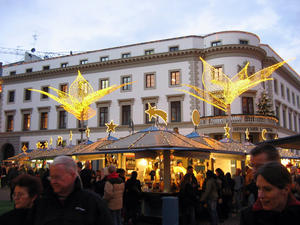CDU-Greens Coalition: No Rush Please, We’re Hessian
A mere four months after the Hessian state election, the new CDU-Greens (aka black-green) coalition has duly confirmed Volker Bouffier as Minister President after one tiny glitch (more on that below). While the guys in Hesse took their time, everyone is now very excited, because a successful CDU-Greens coalition would open up a whole host of possibilities beyond the entrenched 2+(2+1) pattern of party competition in Germany.
- Home of the CDU-Greens Coalition: Hessischer Landtag Wiesbadenmuckster / Foter.com / CC BY-NC-SA
It is not, however, exactly a first: From 2008 to 2010, the city state of Hamburg was governed by a black-green coalition, and from 2009, an even more unlikely ‘Jamaica’ (black-green-yellow, i.e. CDU/Green/FDP) coalition governed in the Saarland before it collapsed in 2011. The media’s official excuse for getting overexcited is that Hesse is the first ‘Flächenland’ (‘area state’, i.e. not a city state) where the new coalition format is tested. But the real reason is that Hesse is at the same time the most likely and the most unlikely place for such an experiment.
Why is Hesse Special?
Hesse holds a special place in the heart of every red-blooded German Politics anorak because it is unusual. Although it has a huge rural core and its traditional industries have been in decline for a very long time, it was dominated by the Social democrats for decades. Back in the 1980s, it became the test bed for red-green coalitions when a young Joschka Fischer was sworn in as the first green minister in Germany, wearing his trademark trainers (now kept in a museum).
Then, the tide turned. In 1999, Roland Koch won the election for the CDU and became Minister President, an office he held until he resigned in 2010 in a surprise move to take a job in the industry. Koch survived a major donation scandal as well as various minor scandals, a lost election (after which he hung on as head of a minority cabinet) and an endless string of controversies over his rather aggressive and often (right-wing) populist approach to politics. During his reign, Hesse’s party system became even more polarised and segmented than it had been in the past. And CDU-led government in Hesse seemed all but inevitable.
What’s in a Bunch of Names?
Back in 2008, Koch, proud bearer of a proper German name (which translates as ‘cook’), authorised a series of posters highlighting the fact that two of the opposition parties were indeed led by folks with very foreign-sounding names (Al-Wazir of the Greens and Ypsilanti of the SPD), while the third opposition party (led by someone with a less suspicious name) was labelled as “Communist”. His attitude left a lot of bad blood. Nonetheless, his successor (hint: French-sounding name), though a long-term ally of Koch and widely considered a law & order politician, was able to embark on a series of talks with all political parties after the election, which had given none of the usual proto-coalitions an outright majority.
More importantly, he convinced Al-Wazir, his old political enemy from the days when Bouffier was known (or admired) as the ‘Black Sheriff’ of Hessian Home Affairs, to become his deputy. During the talks, Bouffier emerged as an unexpectedly shrewd political operator who presented his party – in Hesse, the other Länder and perhaps even in Berlin – with a new option beyond the unloved Great Coalition and the outdated CDU/FDP formats. If a CDU-Greens coalition can work in Hesse, it might work just everywhere.
So what was the glitch? In the first ballot, some MPs were given ballot papers listing the candidate’s name as ‘Max Mustermann’ (Sam Specimen), a popular placeholder for document templates. Allegedly, at least one person voted for this familiar character. Consequently, a second ballot had to be held. The current rapprochement not withstanding, names still seem to be a bit of a problem in Hesse.


RT @kai_arzheimer: New post: The #CDU-#Greens Coalition in #Hesse: Why It Matters » kai arzheimer http://t.co/cNFpLZfRt6 #Germany
RT @kai_arzheimer: New post: The #CDU-#Greens Coalition in #Hesse: Why It Matters » kai arzheimer http://t.co/cNFpLZfRt6 #Germany